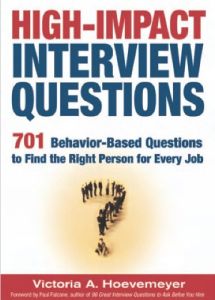Join getAbstract to access the summary!

Join getAbstract to access the summary!
Victoria A. Hoevemeyer
High-Impact Interview Questions
701 Behavior-Based Questions to Find the Right Person for Every Job
AMACOM, 2005
What's inside?
Use "behavior-based" questions to assess job applicants` skills and prevent yet another lousy hire.
Recommendation
Selecting the right person for a job is both an art and a science. To help you improve your chances of finding the right person, author Victoria A. Hoevemeyer proposes that human resource departments and hiring managers should ask applicants explicit questions about their skills and behavior. This approach, known as "Competency-Based Behavioral Interviewing" (CBBI), provides a clear picture of what candidates actually did in their previous jobs. Hoevemeyer’s sensible idea is that if candidates succeeded at certain tasks before, they’ll repeat their success in their new jobs. She provides a very long list of detailed questions that hiring managers can use to learn the specifics of candidates’ skills and past performance. However, the book lacks proof that the CBBI process actually results in recruiting new hires who perform well and have better retention rates. Still, since Hoevemeyer’s approach clearly elicits rich information, getAbstract believes that managers and even experienced HR professionals may find her interviewing tactics useful.
Summary
About the Author
Victoria A. Hoevemeyer is an independent consultant with more than 20 years’ experience helping organizations make the transition from traditional to behavior-based personnel interviewing.
















Comment on this summary